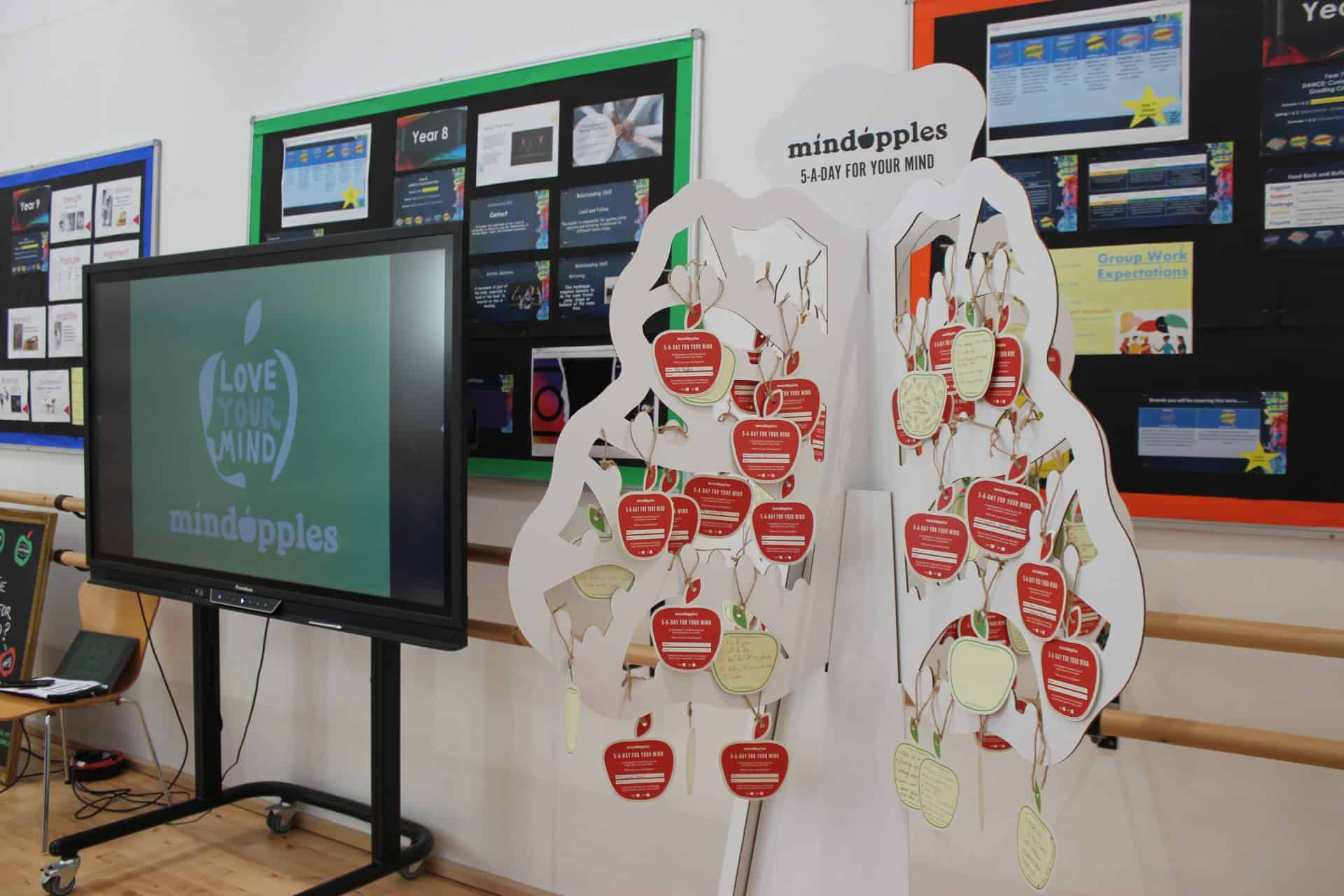
How Mindapples helps schools bring mental wellbeing into everyday education – in line with national guidance.
Embedding Wellbeing Across the School Community
The Department for Education’s Whole School or College Approach to Mental Health and Wellbeing (2021) sets out a clear vision: that schools and colleges should promote “an ethos and environment that promotes respect and values diversity,” where all students feel “safe and able to talk openly about mental health.”
At Mindapples, we share this vision and are helping schools bring it to life through practical, evidence-informed workshops. Our mission is to make looking after our minds as natural as brushing our teeth. We believe mental wellbeing shouldn’t be something we only talk about when there’s a problem, it should be part of everyday habits and school culture.
Our approach aligns with the DfE’s call for wellbeing to be “planned, consistent and part of wider school improvement work.” We support this by offering tools and conversations that strengthen emotional resilience, build self-awareness, and develop positive mental habits which benefits students, staff, parents, carers, and the wider school community.
Our work is grounded in a clear theory of change. Our aim is to help people shift how they think about mental health, develop practical understanding of how their minds work, form daily habits that support wellbeing, and create environments where mental health is supported collectively and without stigma.
What’s Happening in Schools This Month
Mindapples has been delivering workshops with KS4 and KS5 students, as well as teaching staff, in schools across London. These sessions are practical, inclusive and person-centred, helping people discover what supports their mental wellbeing.
They are also discussion-led and community-focused, encouraging whole-school communities to explore everyday ways to care for their mental health. Young people are encouraged to choose what works for them, so they can feel more confident navigating adolescence and growing into adulthood.
Topics include healthy routines and screen-time habits in our Sleep Well session, everyday self-care and emotional regulation in Feed Your Mind, and stress management and emotional resilience for staff in Handling Pressure.
Each session includes visual tools such as the “5-a-day for your mind,” and encourages reflection, participation, and autonomy. Students and staff leave with something tangible they can try in their own time, something that feels relevant and achievable.
This month, schools like Beckmead and Leyton Sixth Form College are continuing to build whole-school wellbeing cultures with the support of Mindapples workshops. New groups of students are beginning their sessions, and staff workshops are being planned to embed a consistent, shared approach to mental health. At Beckmead, a parent meet-and-greet is also in the works, giving families a chance to understand the sessions and support their children at home. This whole-community approach is key to making wellbeing sustainable.
Bringing National Guidance to Life
Mindapples helps schools put national guidance into action in a way that’s practical and sustainable.
Our work supports all eight of the DfE’s whole-school wellbeing principles: from staff development and student voice to curriculum alignment and family engagement. We also support schools to develop their culture and ethos around mental health, so that what’s explored in a workshop shows up in the corridors, classrooms, and conversations at home.
Our sessions align closely with the RSHE statutory curriculum for secondary schools, especially the “Physical health and mental wellbeing” strand. Students learn about sleep, stress, emotional health, digital habits and how to seek support when things get tough through interactive, age-appropriate content that complements PSHE delivery.
We also work with staff because they play a vital role in creating mentally healthy schools. Our sessions support teachers’ own wellbeing, while also equipping them with tools and confidence to model healthy habits and embed mental health education across the curriculum. A whole-school approach means supporting everyone, to help create a culture where mental health is understood, prioritised, and supported collectively.
Impact in School Communities
We’ve seen encouraging changes in how students and staff think about their minds. Students told us they felt calmer, more in control, and more aware of simple ways to support their mental wellbeing. Staff shared that the training encouraged them to reflect on their own habits and take more active steps to protect their wellbeing, not just for themselves, but to better support others.
In 2023, 97% of school staff said they were more aware of mental health factors after our training, and 91% said they would recommend it to a colleague.
Feedback shows the sessions are helping people pause, reflect, and try small things that make a difference, whether that’s limiting screen time, building better routines, or simply noticing how they feel.
Looking Ahead
As more schools and trusts seek to embed sustainable wellbeing practices, Mindapples is expanding its delivery across the UK. New partnerships are forming with Beckmead, Leyton Sixth Form College, and other education providers.
We’re developing our evaluation tools to support pre and post-session feedback, helping schools track impact over time. Our focus remains on helping communities make mental health normal, habit-forming, and empowering for everyone.
Want to Know More?
Our work in schools continues to grow, helping students build resilience and teachers foster a culture of everyday mental wellbeing. A longer feature coming soon will share insights from inside the classrooms and staffrooms that show how small changes can create lasting impact.
To find out more or explore how we can support your school community, contact schools@mindapples.org
